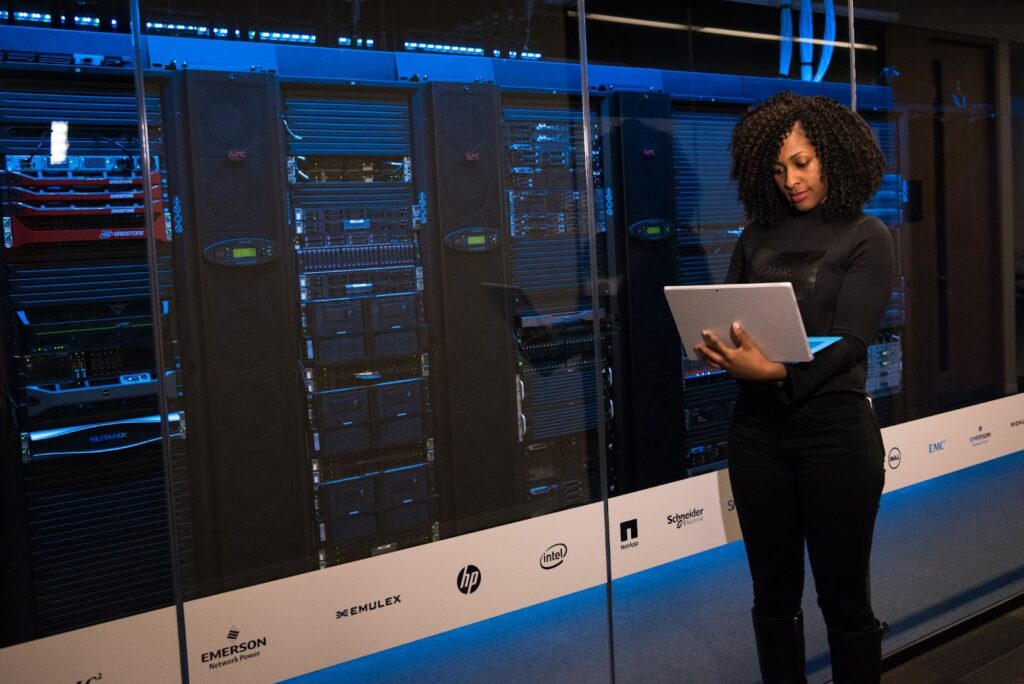Data centers are one of the most important assets of a business, so it’s essential they are functional and reliable at all times. With power grids becoming more unstable due to lack of infrastructure upgrades and an increasing number of extreme weather events, it’s becoming increasingly important to ensure that your business’ data center has an uninterruptible power supply (UPS). These devices provide backup power during blackouts or brownouts. They also ensure that critical equipment continues running even when the main source of electricity fails.
In this article, we’ll take a look at why it’s an essential piece of equipment for a workplace such as a data center and factors to consider when choosing one.
What is an uninterruptible power supply?
An uninterruptible power supply (UPS) is a type of backup power system that provides emergency power to a load when the input power source fails. This is essential for data centers, which need to keep their systems up and running at all times to avoid downtime and data loss. A UPS differs from a standby generator in that it will provide near-instantaneous power to the load, whereas a generator takes time to start up and reach full operating capacity.
A UPS protects electronic equipment from damage or data loss due to power surges, voltage spikes, brownouts, and blackouts. It can also provide uninterrupted battery backup in the event of a power outage.
There are several different types of UPS systems, each with its own advantages and disadvantages. The most common type is the standby UPS, which is typically used in small data centers. Standby UPS systems provide power for a short period of time, typically 10-15 minutes, which is enough to keep your data center running long enough to shut down gracefully.
Another type of UPS system is the line-interactive UPS, which is more commonly used in larger data centers. Line-interactive UPS systems provide power for a longer period of time, typically 30-60 minutes. They also offer protection against power fluctuations, which can help extend the life of your equipment and protect more sensitive devices, like medical or lab equipment.
What are the benefits of an uninterrupted power supply?
There are several benefits of using a UPS system:
1. Reduced downtime: A UPS system can keep your equipment running during a power outage, allowing you to avoid costly downtime.
2. Improved equipment protection: A UPS system protects your equipment from power surges and spikes, which can damage sensitive electronic components.
3. Peace of mind: Knowing that your equipment is protected by a UPS system can give you peace of mind in the event of a power outage. It allows you the flexibility of safely shutting down your systems in the event of a prolonged outage in the event power will not be quickly restored or an additional power source such as a generator is unavailable.
4. Better energy efficiency: Some UPS systems include features that can help improve your energy efficiency, such as voltage regulation and battery management.
Factors to consider when choosing a data center power supply
Size
It’s important to consider where the UPS system will be stored. They can range from the size of a desktop computer to an entire room. How big will depend on what the UPS system will be used to provide power for: if the entire data center, then it will require its own separate room for safety reasons. For most, however, the UPS system can be installed close to the equipment it will be powering.
Runtime
This depends on your specific data center needs. If you need a battery with longer runtimes of 10-15 minutes or more, you’ll need a UPS with a smaller wattage percentage load. For example, you may want to look at a unit where your current load is only 50% (or less) of the max rated UPS capacity. Another thing to consider is cost: the bigger battery runtime, the higher the cost, both in terms of the actual UPS system and in terms of annual maintenance.
Capacity
Capacity – or power – is measured in “watts”. The bigger the capacity, the more devices it can support. To choose the right UPS, you should calculate the load (combined power of your devices). It’s better to choose a UPS with a watt capacity that’s 25% higher than the total wattage of devices needed to connect in order to help deal with fluctuations in power demand and to reduce the chance of overload.
ConclusionUninterruptible power supplies provide data centers with security and reliability in the case of a blackout or power outage and will protect electronic equipment from damage or data loss. At Odyssey Power, we assist our clients in implementing power solutions that are reliable and efficient. As the only third party service provider in California with both UPS and Generator technicians, we are uniquely suited to assist you in finding the right critical power solutions for your business. Contact us today for more information.

